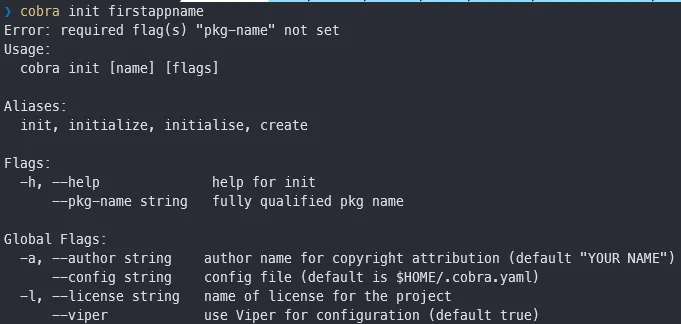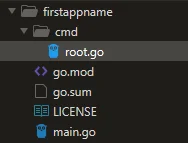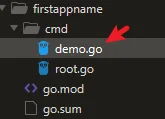golang常用库:cli命令行/应用程序生成工具-cobra使用
一、Cobra 介绍
我前面有一篇文章介绍了配置文件解析库 的使用,这篇介绍 Cobra 的使用,你猜的没错,这 2 个库都是同一个作者 spf13,他开发了很多与 golang 相关的库,他目前在 google 领导着 golang 产品相关开发工作。
Cobra 是关于 golang 的一个命令行解析库,用它能够快速创建功能强大的 cli 应用程序和命令行工具。
它被很多知名的项目使用,比如 Kubernetes,Github CLI,Etcd 等。更多应用此库的项目列表。
我们平常用到命令:git commit -m "message",docker containter start 等都可以用 cobra 来实现。
Cobra 相关文档地址:
- github地址,https://github.com/spf13/cobra
- site地址,https://cobra.dev/
Cobra 的logo:

(from:https://github.com/spf13/cobra)
二、功能特性介绍
- 很多子命令的CLIS: 比如 app server、app fetch 等
- 支持嵌套子命令(sub-command)
- 轻松完成应用程序和命令的创建:cobra init appname 和 cobra add cmdname
- 为应用程序生成 man 手册
- 全局、本地和级联 flag
- 为 shell 程序完成自动提示(bash,zsh,fish, powershell etc.)
- 支持命令行别名,可以帮助你更容易更改内容而不破坏他们
- 灵活定义自己的help、usage信息
- 可选集成 viper 配置管理工具库
更多功能特性请查看: cobra文档介绍
三、Cobra cli 命令结构说明
Cobra 命令结构由3部分组成:
commands、arguments 和 flags
---cobra 命令行格式:
APPNAME VERB NOUN --ADJECTIVE
APPNEM COMMAND ARG --FLAG
例子说明:
hugo server --port=1313 #server 代表 command, port 代表 flag。
git clone URL --bare #clone 代表 command,URL 代表操作的物-argument,bare 代表 flag。
四、Cobra 基本使用方法
golang v1.15, cobra v1.2.1
安装 cobra:
go get -u github.com/spf13/cobra
cobra -hUsage:
cobra [command]
Available Commands:
add Add a command to a Cobra Application
completion generate the autocompletion script for the specified shell
help Help about any command
init Initialize a Cobra Application
init 命令初始化应用程序
go get -u github.com/spf13/cobra/cobra使用命令 cobra init 来创建第一个应用程序,这个命令也是初始化一个应用程序的项目框架:
cobra init firstappname
Error: required flag(s) "pkg-name" not set
报错了,错误信息截图如下:

错误信息:需要设置 --pkg-name 参数。
cobra init --pkg-name firstappname自动生成了如下目录和程序:

下面程序我去掉了英文注释部分。
main.go
package main
import "firstappname/cmd"
func main() {
cmd.Execute()
}
cmd/root.go
package cmd
import (
"fmt"
"os"
"github.com/spf13/cobra"
"github.com/spf13/viper"
)
var cfgFile string
// 构建根 command 命令。前面我们介绍它还可以有子命令,这个command里没有构建子命令
var rootCmd = &cobra.Command{
Use: "firstappname",
Short: "A brief description of your application",
Long: `A longer description that spans multiple lines and likely contains
examples and usage of using your application. For example:
Cobra is a CLI library for Go that empowers applications.
This application is a tool to generate the needed files
to quickly create a Cobra application.`
}
// 执行 rootCmd 命令并检测错误
func Execute() {
cobra.CheckErr(rootCmd.Execute())
}
func init() {
// 加载运行初始化配置
cobra.OnInitialize(initConfig)
// rootCmd,命令行下读取配置文件,持久化的 flag,全局的配置文件
rootCmd.PersistentFlags().StringVar(&cfgFile, "config", "", "config file (default is $HOME/.firstappname.yaml)")
// local flag,本地化的配置
rootCmd.Flags().BoolP("toggle", "t", false, "Help message for toggle")
}
// 初始化配置的一些设置
func initConfig() {
if cfgFile != "" {
viper.SetConfigFile(cfgFile) // viper 设置配置文件
} else {// 上面没有指定配置文件,下面就读取 home 下的 .firstappname.yaml文件
// 配置文件参数设置
home, err := os.UserHomeDir()
cobra.CheckErr(err)
viper.AddConfigPath(home)
viper.SetConfigType("yaml")
viper.SetConfigName(".firstappname")
}
viper.AutomaticEnv()
if err := viper.ReadInConfig(); err == nil {// 读取配置文件
fmt.Fprintln(os.Stderr, "Using config file:", viper.ConfigFileUsed())
}
}
其实上面的错误在 cobra generator 文档里有提示了,所以要多看官方文档。
Long:Run: func(cmd *cobra.Command, args []string) { },
运行程序:go run main.go , 报错了:

我用的是 go v1.15,GO111MODULE="on"。
go mod init firstappnamemodule firstappname
go 1.15
require (
github.com/spf13/cobra v1.2.1
github.com/spf13/viper v1.9.0
)
在运行 go run main.go,第一次运行会下载文件到 go.mod, go.sum 里。再次运行,就会出现 rootCmd 下的 Long 信息。
A longer description that spans multiple lines and likely contains
examples and usage of using your application. For example:
Cobra is a CLI library for Go that empowers applications.
This application is a tool to generate the needed files
to quickly create a Cobra application.
可以看出,用 cobra init 命令初始化的项目, 生成了一个初始化的应用框架,但是没有任何逻辑功能。仅仅输出一些描述性信息。
这个程序里,最重要的是 cmd/root.go 里的 rootCmd = &cobra.Command{} 这行程序,这里定义命令动作。
程序里的 init() 和 initConfig() 函数都是对命令行的配置。
为 rootCmd 添加功能:
var rootCmd = &cobra.Command{
Use: "firstappname",
Short: "A brief description of your application",
Long: `(root)A longer description that spans multiple lines and likely contains
examples and usage of using your application. For example:
Cobra is a CLI library for Go that empowers applications.
This application is a tool to generate the needed files
to quickly create a Cobra application.`,
Run: func(cmd *cobra.Command, args []string) {
fmt.Println("root called")
},
}
go run main.go$ go run main.go
root called
go run main.go --help会输出上面的 Long 信息和完整的帮助信息。
也可以把上面命令编译:go build -o demo.exe,在运行
完整生成一个cobra应用框架的命令:
$ mkdir firstappname
$ cd firstappname
$ cobra init --pkg-name firstappname
$ go mod init firstappname
完整例子在 github 上,golang-library-learning/cobra
add 生成子命令subCmd
cobra initcobra add- 用 add 命令生成子命令代码:
// cd 进入firstappname
$ cd ./firstappname
$ cobra add demo
demo created at D:\work\mygo\common_pkg\cobra\firstappname
在 cmd 目录下生成了 demo.go 文件:

package cmd
import (
"fmt"
"github.com/spf13/cobra"
)
// demoCmd represents the demo command
// 子命令
var demoCmd = &cobra.Command{
Use: "demo",
Short: "A brief description of your command",
Long: `A longer description that spans multiple lines and likely contains examples
and usage of using your command. For example:
Cobra is a CLI library for Go that empowers applications.
This application is a tool to generate the needed files
to quickly create a Cobra application.`,
Run: func(cmd *cobra.Command, args []string) {
fmt.Println("demo called")
fmt.Println("cmd demo")
},
}
func init() {
rootCmd.AddCommand(demoCmd)
}
到现在为止,为 firstappdemo 添加了 2 个 Command 了,分别是根命令 rootCmd 和子命令 demoCmd。
rootCmd.AddCommand()Run 方法里添加程序:fmt.Println("cmd demo")。一般这里的程序都是其他 package 里完成了具体逻辑,然后 Run 方法里在调用这些程序。
go run main.go demo输出:
demo called
cmd demo
也可以编译项目 go build -o xxx 在运行。
Flags使用-给Command添加flags
flag 命令行选项,也叫标识,对command命令行为的进一步指示操作。
用这个标识可以给 command 添加一些可选项。
根据 flag 选项作用范围不同,可以分为 2 类:
-
Persistent Flags,持久化的flag,全局范围
如果设置全局范围的flag,可以用这个来设置。它既可以给根命令设置选项值,也可以给子命令设置选项值。
下面例子里的 rootCmd 和 demoCmd 都可以调用 flag。
-
Local Flags,局部flag,只对指定的command生效。比如某个子命令的 flag。
因为 flag 标识是在命令行后面不同位置使用,所以我们要在方法外定义一个变量,来分配存储使用这个标识符。下面例子会说明。
Persistent Flags 全局flag例子
var cfgFile string
// 添加 name
var name string
rootCmd.PersistentFlags().StringVar(&cfgFile, "config", "", "config file (default is $HOME/.firstappname.yaml)")
// 添加全局 flag
rootCmd.PersistentFlags().StringVar(&name, "name", "", "Set one name")
Run: func(cmd *cobra.Command, args []string) {
fmt.Println("demo called")
fmt.Println("cmd demo")
// 打印输出 name
fmt.Println("print persistent flag name: ", name)
},
$ go run main.go demo --name setname
demo called
cmd demo
print persistent flag name: setname
$.\cobrademo.exe demo --name setname1
demo called
cmd demo
print persistent flag name: setname1
Persistent flag 的读取方法:
// arg1:存储变量,
// arg2:设置长flag名,这里 name 显示 --name,
// arg3:设置短flag名,这里 n 显示 -n,一般与上面对应
// arg4:默认值, 这里设置为 ""
// arg5:flag的一些说明信息
PersistentFlags().StringVarP(&name, "name", "n", "", "Set one name")
// 与上面用法基本相同,只是没有短 flag 设置
PersistentFlags().StringVar(&name, "name", "", "Set one name")
// 直接设置flag名,arg1:flag 名,arg2:默认值,arg3:说明
PersistentFlags().String("foo", "", "A help for foo")
Local Flags例子
一个 flag 赋值给本地变量,只能对指定的command生效。
我们在 demo.go 中测试 local flag。
- 在 cmd/demo.go 文件中定义变量 dsn,存储这个 flag 值
// 定义 local flag
var dsn string
demoCmd.Flags().StringVarP(&dsn, "dsn", "d", "", "dsn file")
Run: func(cmd *cobra.Command, args []string) {
fmt.Println("demo called")
fmt.Println("cmd demo")
// 打印输出 name
fmt.Println("print persistent flag name: ", name)
// 打印输出local flag: dsn
fmt.Println("(local flag)print dsn: ", dsn)
},
$ go run .\main.go demo --dsn setdsn1
demo called
cmd demo
print persistent flag name:
(local flag)print dsn: setdsn1
测试下其它子命令可以不可以获取这个 dsn,添加一个新的子命令 demo2,
$ cobra add demo2
在目录 cmd 下添加了文件 demo2.go, 在 Run 下添加:
Run: func(cmd *cobra.Command, args []string) {
fmt.Println("demo2 called")
// 添加输出 dsn
fmt.Println("test get local flag(dsn): ", dsn)
},
测试:
$ go run .\main.go demo2 --dsn testdsn
Error: unknown flag: --dsn
报错了,程序终止运行了。
说明:local flag 局部选项,只能作用于指定的 command。本例子中作用于 demoCmd,而不能作用于 demo2Cmd。
local flag 的读取方法:
// arg1:存储变量,
// arg2:设置长flag名,这里 name 显示 --name,
// arg3:设置短flag名,这里 n 显示 -n,一般与上面对应
// arg4:默认值, 这里设置为 ""
// arg5:flag的一些说明信息
// 方法(1)
Flags().StringVarP(&name, "name", "n", "", "Set one name")
// 与上面方法(1)用法基本相同,只是没有短 flag 设置
Flags().StringVar(&name, "name", "", "Set one name")
// 直接设置flag名,arg1:flag 名,arg2:默认值,arg3:说明
Flags().String("foo", "", "A help for foo")
// 与上面方法(1)用法基本相同,除了第一个没有变量读取参数
Flags().StringP("toggle", "t", false, "Help message for toggle")
完整例子在 github 上,golang-library-learning/cobra
设置flag必填项
比如给 demo.go 的 dsn 这个 flag 设置必选项
demoCmd.Flags().StringVarP(&dsn, "dsn", "d", "", "dsn file")
// 把 dsn 设置为必选项
demoCmd.MarkFlagRequired("dsn")
go run main.go demoError: required flag(s) "dsn" not set$ go run .\main.go demo
Error: required flag(s) "dsn" not set
Usage:
firstappname demo [flags]
Flags:
-d, --dsn string dsn file
-h, --help help for demo
Global Flags:
--config string config file (default is $HOME/.firstappname.yaml)
--name string Set one name
Error: required flag(s) "dsn" not set
exit status 1
go run main.go demo --dsn setdsn$ go run main.go demo --dsn setdsn
demo called
cmd demo
print persistent flag name:
(local flag)print dsn: setdsn
绑定配置
还可以绑定配置到 flags 上,用 viper
initConfig()init()func init() {
cobra.OnInitialize(initConfig)
... ...
}
我们可以在 init() 方法中添加绑定 flag 程序,
rootCmd.PersistentFlags().StringVar(&name, "name", "", "Set one name")
viper.BindPFlag("name", rootCmd.PersistentFlags().Lookup("name"))
这样就将 viper 配置和 flag 绑定,如果用户不设置 --name,将从配置中查找。
更多方法请查看 viper flag doc
arguments 命令行参数设置
可以用Command 的 Args 字段指定参数效验规则。
Cobra 也内置了一些规则:
-
NoArgs:如果有任何命令行args参数,将会报错
-
ArbitraryArgs:该命令接受任何参数
-
OnlyValidArgs:如果该命令参数不在 Command 的 ValidArgs 中,将会报错
-
MinimumArgs(int): 如果命令参数数目少于N个,将会报错
-
MaximumArgs(int): 如果命令参数数目多于N个,将会报错
-
ExactArgs(int): 如果命令参数数目不是N个,将会报错
-
RangeArgs(min, max):如果命令参数数目范围不在(min, max),将会报错
内置效验规则的例子:
var rootCmd = &cobra.Command{
Use: "dmeo",
Short: "demo short",
Long: `let's do it, demo!`,
Args: cobra.MinimumNArgs(5),
Run: func(cmd *cobra.Command, args []string) {
fmt.Println("hello chenqionghe")
},
}
自定义验证规则的例子:
var cmd = &cobra.Command {
Short: "demo",
Args: func(cmd *cobra.Command, args[] string) error {
if len(args) > 0 {
return errors.New("requires a color argument")
}
if myapp.IsValidColor(args[0]) {
return nil
}
return fmt.Errorf("invalid color specified: %s", args[0])
},
Run: func(cmd *cobra.Command, args []string) {
fmt.Println("Hello, demo!")
},
}
钩子函数 PreRun and PostRun Hooks
Persistent * Run函数的执行顺序为:
- PersistentPreRun
- PreRun
- Run
- PostRun
- PersistentPostRun
package main
import (
"fmt"
"github.com/spf13/cobra"
)
func main() {
var rootCmd = &cobra.Command{
Use: "root [sub]",
Short: "My root command",
PersistentPreRun: func(cmd *cobra.Command, args []string) {
fmt.Printf("Inside rootCmd PersistentPreRun with args: %v\n", args)
},
PreRun: func(cmd *cobra.Command, args []string) {
fmt.Printf("Inside rootCmd PreRun with args: %v\n", args)
},
Run: func(cmd *cobra.Command, args []string) {
fmt.Printf("Inside rootCmd Run with args: %v\n", args)
},
PostRun: func(cmd *cobra.Command, args []string) {
fmt.Printf("Inside rootCmd PostRun with args: %v\n", args)
},
PersistentPostRun: func(cmd *cobra.Command, args []string) {
fmt.Printf("Inside rootCmd PersistentPostRun with args: %v\n", args)
},
}
subCmd := &cobra.Command{
Use: "sub [no options!]",
Short: "My subcommand",
PreRun: func(cmd *cobra.Command, args []string) {
fmt.Printf("Inside subCmd PreRun with args: %v\n", args)
},
Run: func(cmd *cobra.Command, args []string) {
fmt.Printf("Inside subCmd Run with args: %v\n", args)
},
PostRun: func(cmd *cobra.Command, args []string) {
fmt.Printf("Inside subCmd PostRun with args: %v\n", args)
},
PersistentPostRun: func(cmd *cobra.Command, args []string) {
fmt.Printf("Inside subCmd PersistentPostRun with args: %v\n", args)
},
}
rootCmd.AddCommand(subCmd)
rootCmd.SetArgs([]string{""})
rootCmd.Execute()
fmt.Println()
rootCmd.SetArgs([]string{"sub", "arg1", "arg2"})
rootCmd.Execute()
}
运行程序:
$ go run .\hookdemo.go
Inside rootCmd PersistentPreRun with args: []
Inside rootCmd PreRun with args: []
Inside rootCmd Run with args: []
Inside rootCmd PostRun with args: []
Inside rootCmd PersistentPostRun with args: []
Inside rootCmd PersistentPreRun with args: [arg1 arg2] // 子命令继承了父命令的函数
Inside subCmd PreRun with args: [arg1 arg2]
Inside subCmd Run with args: [arg1 arg2]
Inside subCmd PostRun with args: [arg1 arg2]
Inside subCmd PersistentPostRun with args: [arg1 arg2]
错误处理函数和钩子函数
与上面的钩子函数功能一样,只不过这里可以返回错误,处理
RunE 功能的执行先后顺序如下:
- PersistentPreRunE
- PreRunE
- RunE
- PostRunE
- PersistentPostRunE
RunE: func(cmd *cobra.Command, args []string) error {
fmt.Printf("Inside subCmd Run with args: %v\n", args)
return nil
},
为你的命令生成文档
Cobra 可以基于子命令、标志等生成文档。具体的使用方法和生产格式文档请点击下面链接:
- Man page docs
- Markdown docs
- Rest docs
- Yaml docs
cmd.DisableAutoGenTag = truehelp 命令
cobra help你还可以定义自己的 help 命令或模板
cmd.SetHelpCommand(cmd *Command)
cmd.setHelpCommand(f func(*Command, []string))
cmd.setHelpTemplate(s string)
五、参考
cobra github
cobra user guide
Cobra Generator
